Last year, I wrote a blog post about tips for AKC Senior Hunter tests. Now that we’ve finished Zara’s Master Hunter title, I figured it was appropriate to write one about the Master level as well. I felt a lot more anxiety and pressure starting to compete at the Master level than I did last year for Senior. Part of it was because Zara has just recently learned to back other dogs and I was worried that she would not stop on her own while being amped up in hunt test. But it was also because I had heard such intimidating things about Master Hunter tests – you’re supposed to be practically silent with commands, judges will pick up your dog if she takes one step to mark a bird falling, and it’s really difficult to get all the passes in a short amount of time.
After actually running in some of these tests, I can tell you that none of the above is completely true. I would venture to say that the Master tests have been more approachable than I thought. Some of the below tips apply to all levels of hunt tests, but I’ve tried to make most of them specific to the Master level.
Get Your Entries in Early
This applies to all levels of hunt tests. I don’t know if it’s partially due to COVID or what, but it seems like every hunt test around here has filled up super fast this year. I would advise that if you see a hunt test is open, get your entry in ASAP. You can usually cancel an entry if needed before the test closes, but it’s better to reserve your spot before they fill up.
Get Bird Contact First, Then Honor
A woman who is a hunt test judge advised me that you should always make sure your dog has had contact with a bird before bringing them in to honor their bracemate. The reasoning behind this is that dogs must find birds at the Master level. If time runs out and they have not found a bird, they will not qualify. However, if time runs out, and they have not had the opportunity for an honor, they are allowed to be called back for that. I have not had that issue in the hunt tests we’ve run, because there have been a lot of birds on the course. But some courses and tests may not have as many. Also, I think it’s a good idea to make sure your dog gets to smell a bird first so that they do not get extra antsy on the honor.
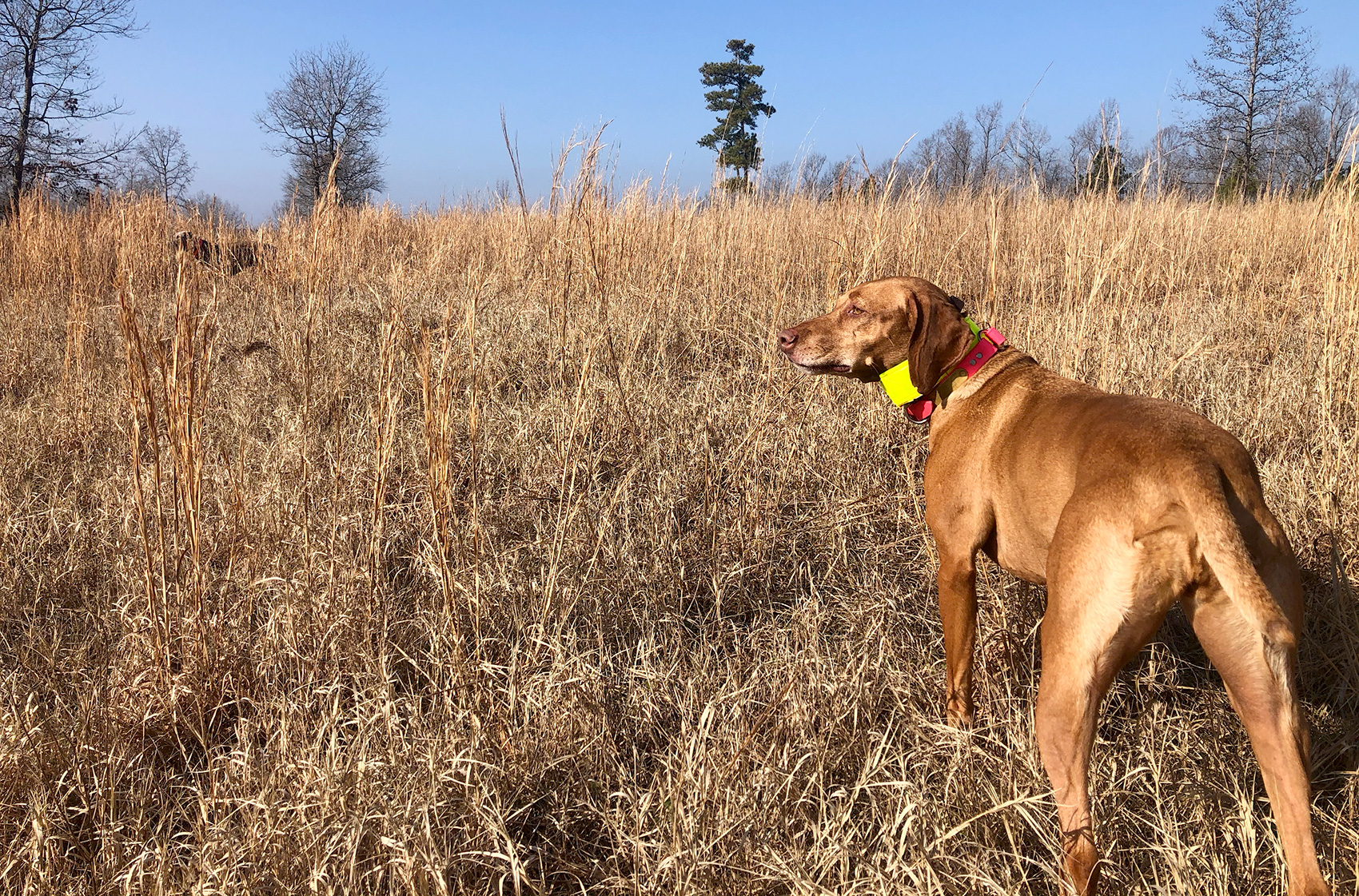
Zara honors a weimaraner.
You Can Use Commands, But Make Them Count
I had heard that judges at the Master level are very stringent, and you can’t use a lot of commands. The AKC’s Pointing Dog Rules Book says “Master dogs must handle kindly, with an absolute minimum of noise.” Reading that, it sounds like you could hardly call your dog at all. But in practice, I’ve found that is not completely true. Coming from the NAVHDA world, I’m used to not giving a lot of commands and I don’t like to “over handle” Zara while she’s running around hunting. I’ll generally let her go where she wants, since she usually stays with me and use a directional command (“this way”) every now and then to turn her or get her going a certain way.
When talking to a hunt test judge, she told me that if you’re going to use a command at the Master level, make it count. For example, if you send your dog to retrieve a bird and it picks it up, but starts going in the other direction, a well-timed “come” command is fine if the dog obeys and comes back toward you. If your dog is running around and you’re shouting its name and its completely ignoring you, that’s not good. In general, the judges seem to be fine with quiet commands (such as a soft “whoa” when the dog is on point), but they don’t want to hear a lot of loud noise and multiple commands in a row (“Fetch. Fetch! FETCH!”).
You Can Caution Your Dog
One question that always seems to be up for debate in bird dog events is whether or not you can use the word “whoa” or something similar. In Master Hunter tests, you can caution your dog while they are on point or honoring – it says so in the rule book. However, it emphasizes the “quietly caution” part. There’s a difference between softly saying “whoa” as you go to flush a bird versus yelling “WHOA!” as your dog is trying to break. I definitely said “whoa” multiple times during a few of our hunt test runs and still came away with 8’s and 9’s in trainability and honoring.
Make Sure Your Dog Can Handle Missed Shots
From what I’ve seen, the gunners at hunt tests miss a lot and they’re also very hesitant to shoot if the situation is in any way unsafe. This results in birds being shot at but not hit. I know that Zara responds differently to the shotgun being shot versus my blank pistol. She is expecting to see a bird fall when a shotgun goes off, and as a result, is a little antsy to get a bird. With the blank pistol, she knows she’s not getting a bird. Make sure your dog has experience with hearing the shotgun go off and being heeled away without getting a retrieve. This helps with honoring too.
You Have to Carry Both A Shotgun and Blank Pistol
Unlike the Senior level, in Master Hunter tests, the handler has to carry a real break-open shotgun or imitation gun. These fake guns can be a wooden silhouette of a gun or a toy shotgun. This is because you have to swing at the flush and pretend you are shooting the bird as the gunners actually shoot it. This tests the dog’s steadiness – it’s even more of a distraction than if you are making eye contact with them the whole time the gunners are shooting. I didn’t have a fake shotgun, but in retrospect, I wish I had. I just carried my real break-open 20 gauge CZ Drake. It is not a heavy gun, but it certainly felt heavy after traipsing through the mud after Zara for 30 minutes! I also found it a little cumbersome to have that and the blank pistol. When I needed to blank a bird, I would be fumbling in my pocket for the blank pistol. You definitely want to get used to carrying and using both.
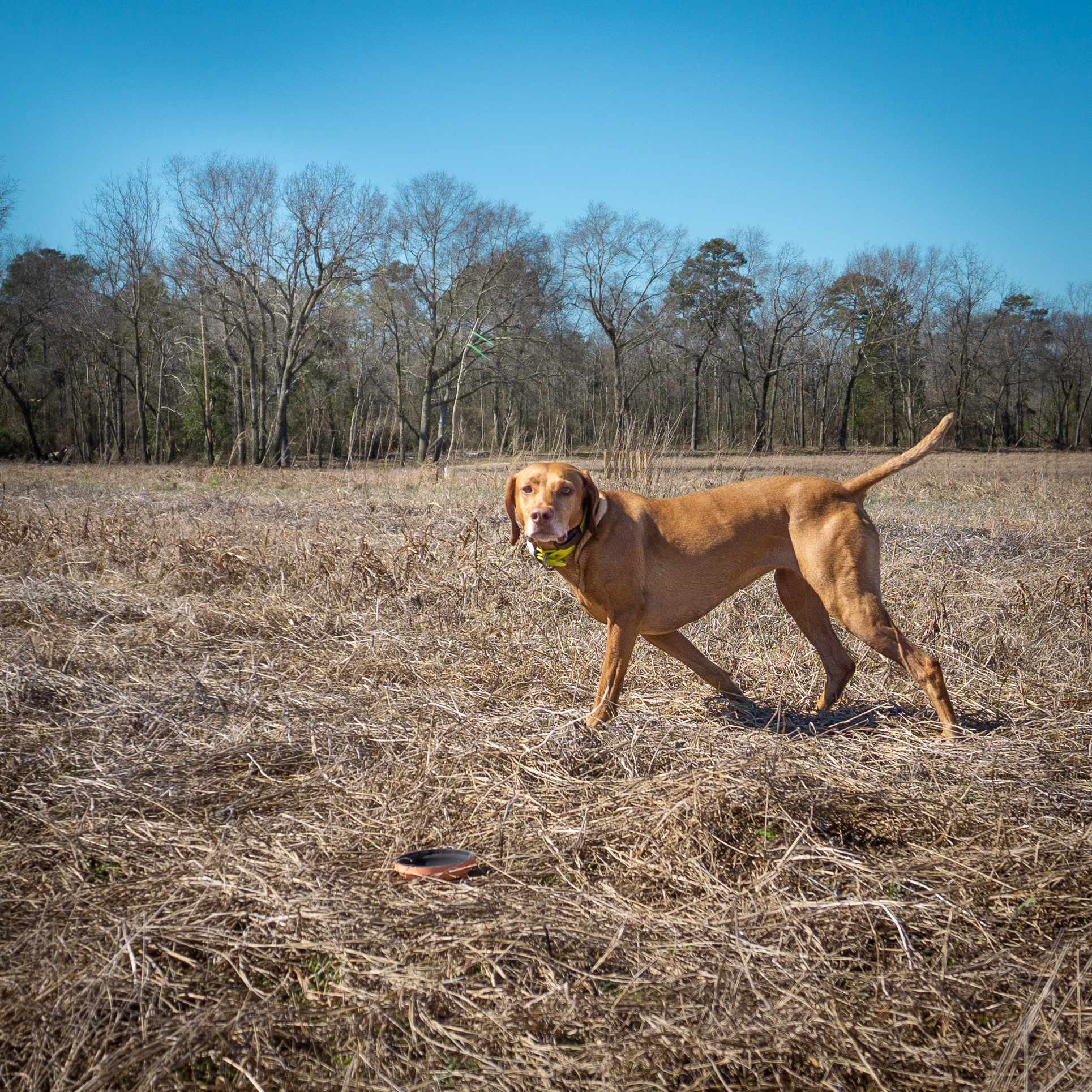
Zara waits for me to flush a bird.
You’re Probably Going to Get Picked Up a Few Times
If your dog has a Senior Hunter title, you’ll need five passes to get a MH title. Otherwise, you need six passes. At the Junior level, a well-bred bird dog with decent obedience is likely to earn the required four passes in four straight tests. This is usually not the case in Master. I don’t think I’ve talked to anyone who has gotten five or six straight passes. I was talking to one professional trainer, and he said that a dog who goes straight from Junior to Master typically requires ten tests to get six passes. Zara and I needed seven tests to get five passes. There’s just so much that can go wrong at the Master level. A lot of times there are issues with honoring, but I’ve also heard about dogs breaking on the shot and picking up birds that won’t fly. So definitely plan on entering more tests than you think you’ll need.
Keep Your Dog Out of the Woods
Trust me, nothing good is going to happen in the woods. If your dog finds a bird and goes on point, the gunners are unlikely to be able to shoot it. Plus, in hunt tests, they typically plant the birds in an open bird field.
Train in All Weather
A good bird dog should be able to handle multiple kinds of weather – hot and dry, windy, and cool, rainy, and wet. But keep in mind that birds really do act differently when it’s raining or the grass is really wet. When the birds get wet, they don’t fly well, or at all. They are also more likely to start running instead of flying. This behavior definitely presents a different challenge for your dog. If the bird won’t fly, you may need to pick it up and throw it. Make sure your dog is used to this. Training in the rain is not fun, but it’s important. A lot of hunt tests are rain or shine events, unless the weather is really dangerous.
Zara and I went to a hunt test a few weekends ago and the weather was just awful. It rained all day Saturday. We encountered multiple birds that were walking, several that weren’t flying, and one that was shot on the ground. Thankfully, Zara handled all these experiences like a pro. I was very thankful for the NAVHDA training days when it was pouring yet we were still out there.
Try to Keep Your Wits About You
A 30-minute hunt test can feel like a lifetime depending on how things are going. Although the dog determines a lot of things, you, as the handler, have a good amount of control. Try to keep in mind what you need to do in order to help your dog to succeed. For example, in one of our first Master Hunter tests, Zara went on point and I couldn’t find the bird. I kicked around for a short amount of time, but I didn’t know where it was. I felt the pressure of everyone watching me and I decided to relocate her, because she typically goes much closer to the bird but will establish point again. Instead, in that situation, she moved forward and then the bird flushed up by itself. She had originally been pointing pretty far off. She started taking steps after the bird as it flushed. Now, that was something I knew she was still a little shaky on (the stop to flush) and we got picked up.
However, if I had stayed calm and taken the time to keep looking for the bird, that wouldn’t have happened. I don’t think she would have moved if she had still been on point. So in subsequent tests, I was patient and expanded the area where I was kicking around until I found the bird.
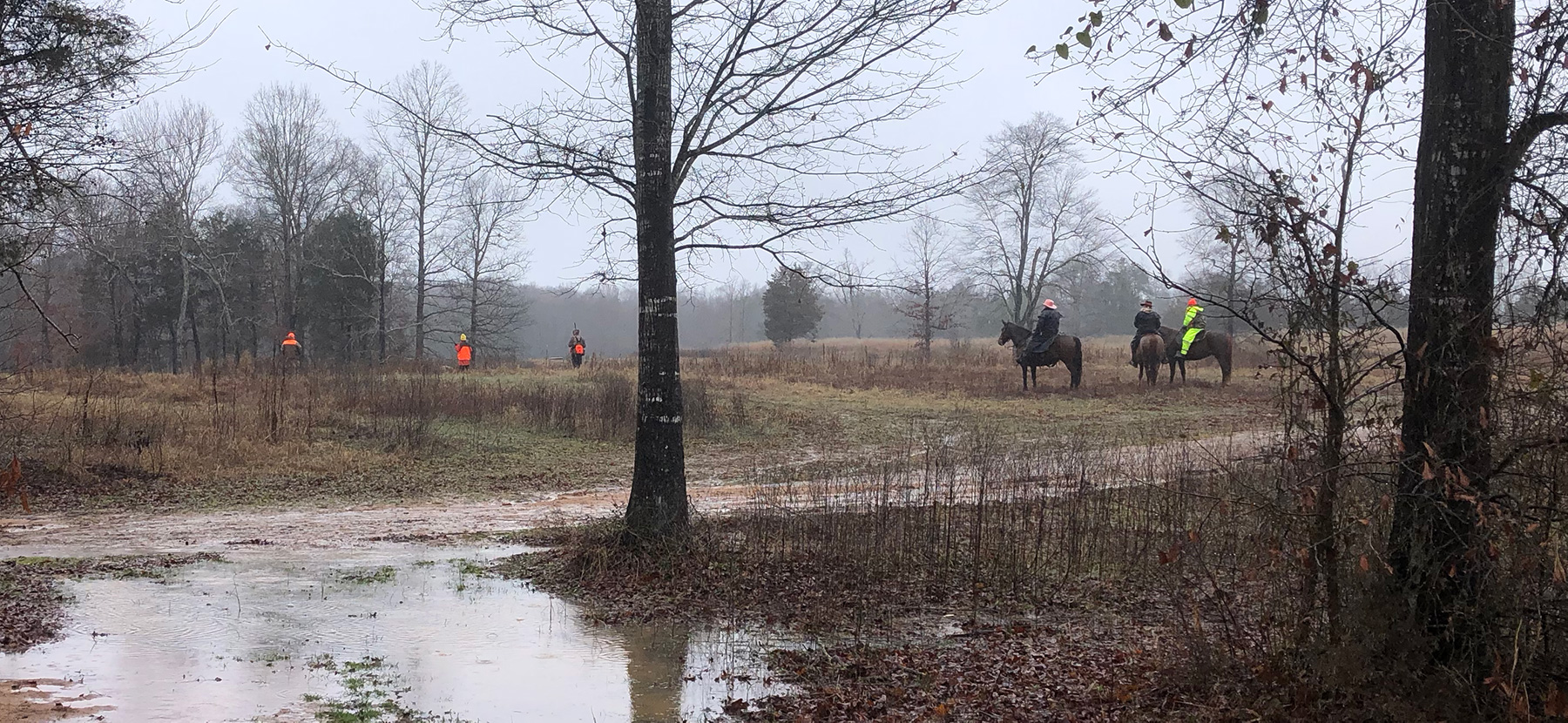
Waiting for our bracemate to retrieve a bird. Zara was running as a bye dog during this brace, so she was much further back then normal. I brought her to my side and gave her a whoa command so we could stay out of the way. As you can see, it was raining and miserable.
Consider Running Senior Hunter First
Some people don’t necessarily see the point of running your dog at the Senior Hunter level. If the ultimate goal is to get a Master Hunter, then why not just train for that and go straight to that level? I think it depends on your experience. If you are a new handler, entering Senior Hunter and getting a feel for the test environment and handling your dog can be very helpful before you get to Master. I ran Senior Hunter with Zara last year because she was not backing other dogs on her own yet. However, she was steady to release and retrieved to hand, whereas your dog can break at the shot and retrieve to within a step or two of the handler at the Senior level.
I’m glad I got her Senior title. It did help me get more experience handling and, as a bonus, we only need 5 passes to get a Master Hunter title. If your dog doesn’t have a Senior Hunter title, they will need 6 passes. Given that Master is much more stringent that Senior, having one less pass to worry about is nice.
Have you run your dog in Master Hunter Tests? Do you have any additional tips to succeed at this level?

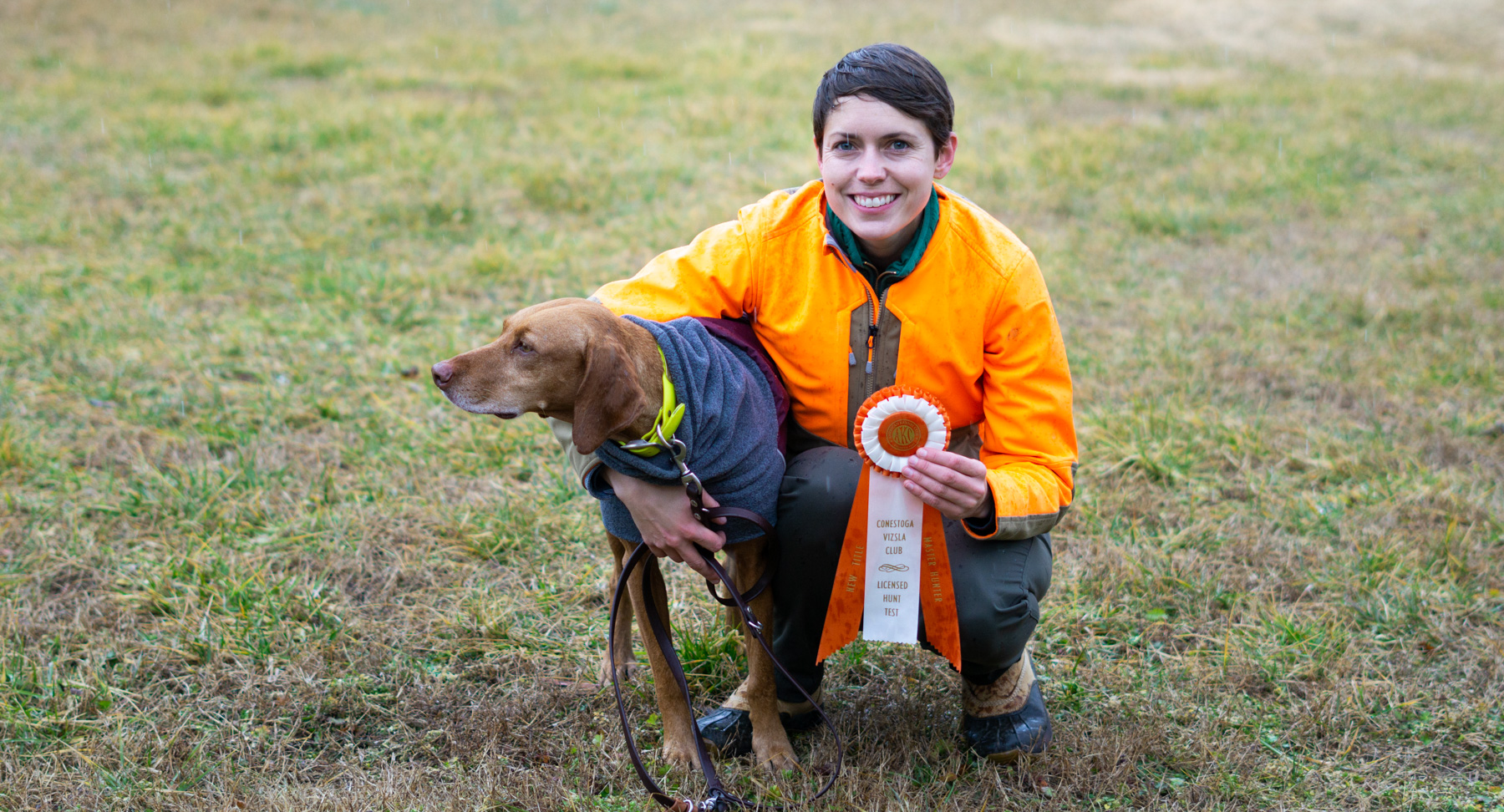

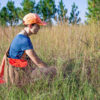
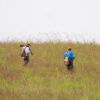

Work on backing with all different dogs.
The more different dogs you can work with the better. Also train with lots of people around that makes a difference also. Practice backing set-ups in the bird field. Your dog may do great backing natural scenarios but when a pointing dog is at up and you have to bring your dog in for a honor, that is hard.
Hi Chad!
I totally agree with you. The more breeds, sizes, and shapes of dogs you can train with the better. And yes, set ups can be hard. I know Zara does not like set ups. She tries to avoid them.
Terry Ann